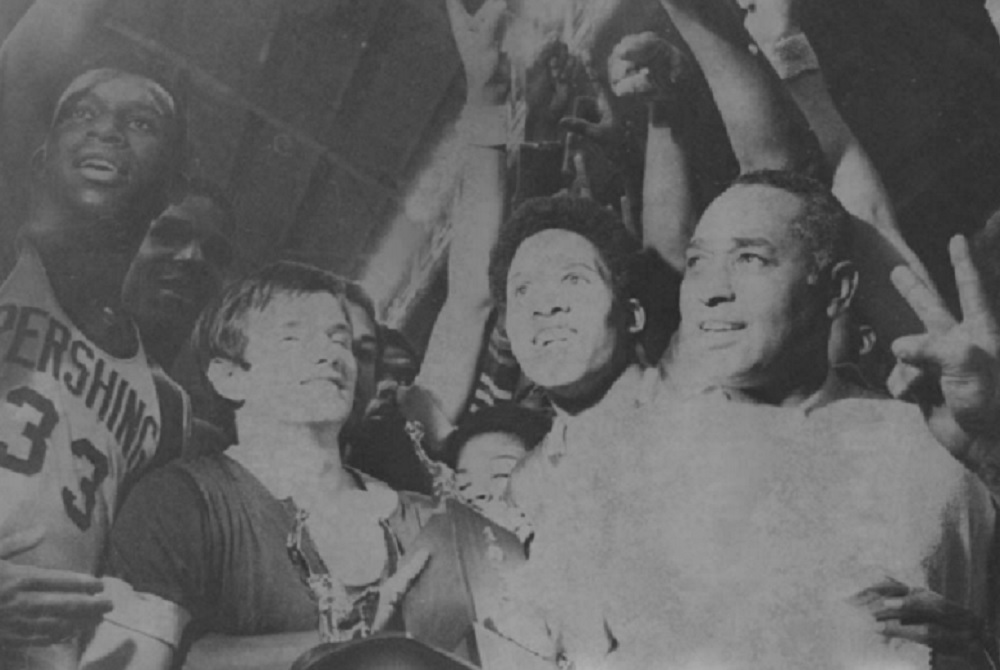
Pershing Sends Robinson Into History with Historic Title Run
By
Ron Pesch
MHSAA historian
March 4, 2021
Just 48 hours before the kickoff of the 45th annual MHSAA Basketball Finals, Illinois State University broke the news that it would hire Detroit Pershing high school coach Will Robinson as the new head of its men’s basketball team.
Before the days of Good Morning America, CNN and ESPN, there was no immediate mention that ISU and the 58-year-old North Carolina native had broken a color line.
Robinson had played high school sports in Steubenville, Ohio, where he won 14 letters in five sports. He then earned a combined 15 letters and served as captain of the football, baseball and gymnastics teams at West Virginia State College, noted the ISU student newspaper, The Vidette, and then served five years as athletic director for YMCA in Pittsburgh and Chicago.
He followed by embarking on a high school school coaching career that would include more than a quarter-century at Detroit schools before he'd move on to become, at ISU, the first African-American head coach of an NCAA Division I college program.
But before beginning that history-making tenure, he guided what remains one of the most memorable, and unexpected, championship triumphs in Michigan high school hoops history.
Coach Rob
“It was shortly after the race riots of 1943 that Warren Bow, then the superintendent of schools, lured Robinson from DuSable High of Chicago,” stated veteran sportswriter Hal Schram of the Detroit Free Press years later. With the arrival of the 1969-70 season, Robinson had spent the previous 26 years as coach in Detroit, arriving at Detroit Miller in 1944. He moved to Detroit Cass Tech in the fall of 1957 when Miller became a junior high, then to Detroit Pershing in the fall of 1961.
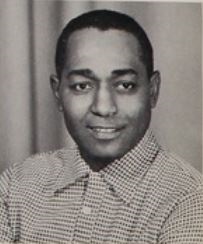 “We had plenty of applicants and interviews from nearly 100 men,” Milt Weisbecker, athletic director at ISU, told the press about the hire on Saturday, Feb. 28. “We feel Will is the man we want. He impressed us with his sincerity and his desire to succeed. We feel he’ll be an excellent recruiter.”
“We had plenty of applicants and interviews from nearly 100 men,” Milt Weisbecker, athletic director at ISU, told the press about the hire on Saturday, Feb. 28. “We feel Will is the man we want. He impressed us with his sincerity and his desire to succeed. We feel he’ll be an excellent recruiter.”
Robinson’s departure for the college ranks would depend on how long his Pershing team hung around the state tournament. The Doughboys had ended the 1969-70 regular season with an 8-4 record.
“Pershing is not one of the favorites,” noted Schram, “but neither was it in (1961-62) when Robinson took a team with a 4-8 record to the Class A semifinals. Then in 1967 Pershing went all the way to a State title with Spencer Haywood and Ralph Simpson as its top stars.”
Earlier in the year, Schram had reminded readers of the Detroit Public School League’s self-imposed boycott that kept city schools away from outstate competition and the MHSAA postseason tournament from 1930-1961.
“For many years, Detroit’s public schools (considered themselves) the best in Michigan,” he explained. “The boast could not be answered, because until 1961 the Detroit teams were not permitted (by school administration) to leave their area. In the years since their return to the state tournament, however, the locals have done little to support the earlier boast. With one exception (they’ve) fallen flat in the State tournament.”
That one team was Robinson’s 1967 champs.
Wealth of Talent
While, as usual, four basketball teams would finish 1970 as Finals champs, Class A was of particular interest to many around the state. The classification was packed with court talent. While the senior class included players of wide-ranging skills, a collection of incredible underclassmen would have the most impact on the postseason.
Based on Schram’s season-ending rankings, Ferndale was his pick to win it all in Class A. The Eagles had previously grabbed titles in 1963 and 1966 in the MHSAA’s classification featuring the schools with the largest enrollments. Each championship had come under current coach Roy Burkhart’s leadership.
“Ferndale has one major challenger – Pontiac Central,” said Schram. “This has been a Ferndale-Pontiac Central year in Class A,” he noted in his pre-tournament preview. “Both own 16-0 records. Providing they both survive district, regional and quarter-final eliminations these two rivals could tangle in either the semifinals or finals …”
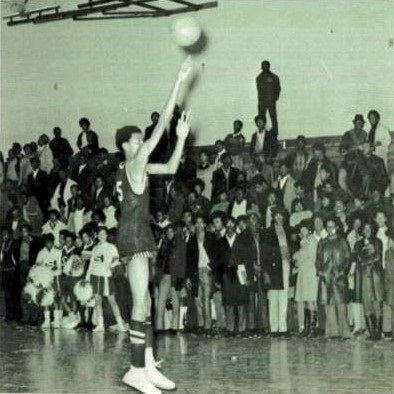 He acknowledged “second-line challengers” could be found among Birmingham Seaholm, his third-ranked team; Detroit Kettering, the top team in the PSL, led by 6-foot-4 senior Floyd Haywood (Spencer’s brother) and junior Lindsay Hairston; Detroit Martin Luther King, second in the PSL and powered by senior George ‘Twiggy’ Gervin (named one of the 50 greatest players in NBA history in 1996 - ‘The Iceman’ nickname would come later); Detroit Northeastern and star guard Mike Robinson (who would go on to set a Michigan State University all-time scoring mark and twice lead the conference in scoring despite previous doubts of if, at 5-foot-10, he could play Big Ten basketball), Battle Creek Central, with all-state selection Dave Freeman; Grand Rapids Union, featuring 6-foot-5 senior Gerald Edwards; Grand Rapids Ottawa Hills, seeking its third-straight Class A crown; and twice-beaten Flint Central, led by Mike DeCou and Bob Stone.
He acknowledged “second-line challengers” could be found among Birmingham Seaholm, his third-ranked team; Detroit Kettering, the top team in the PSL, led by 6-foot-4 senior Floyd Haywood (Spencer’s brother) and junior Lindsay Hairston; Detroit Martin Luther King, second in the PSL and powered by senior George ‘Twiggy’ Gervin (named one of the 50 greatest players in NBA history in 1996 - ‘The Iceman’ nickname would come later); Detroit Northeastern and star guard Mike Robinson (who would go on to set a Michigan State University all-time scoring mark and twice lead the conference in scoring despite previous doubts of if, at 5-foot-10, he could play Big Ten basketball), Battle Creek Central, with all-state selection Dave Freeman; Grand Rapids Union, featuring 6-foot-5 senior Gerald Edwards; Grand Rapids Ottawa Hills, seeking its third-straight Class A crown; and twice-beaten Flint Central, led by Mike DeCou and Bob Stone.
“A successful tournament run by any other Class A quintet,” said Schram, “would be a major upset.”
Both The Associated Press and United Press International agreed with the Free Press on the top two schools, but each named Pontiac Central, led by Campanella ‘Campy’ Russell, as the top team in Class A in their respective regular-season polls, with Ferndale finishing second in the rankings.
“Take it from a couple college coaches who should know,” wrote Bob Gross from the Lansing State Journal, “the best Class A high school basketball teams in Michigan are Pontiac Central and Detroit Kettering. Michigan State’s Gus Ganakas likes Pontiac and 6-6 junior Campy Russell while Michigan’s Johnny Orr leans toward Kettering and 6-7 Lindsay Hairston.”
“I’ve seen a lot of outstanding teams,” Ganakas told Gross, “but Pontiac is solid. In Russell, they have a player who is tremendously strong on the boards as well as scoring.”
“Kettering looks very strong to me,” noted Orr. “I haven’t seen Pontiac or Ferndale but my assistants have and they tell me both are excellent teams. … Ypsilanti and Battle Creek Central also are fine teams.”
Kettering had finished third in the AP poll, fourth according to UPI but eighth in Schram’s “Top Ten.”
Ypsilanti, noted Gross, had lost to Ottawa Hills in the Class A title game a year before, and was coming on strong. The Bearcats of Battle Creek Central, had “sailed through the Six-A League and posted a 16-1 record losing only to Ann Arbor Huron in one of the state’s biggest upsets.” The Bearcats finished the regular season at No. 3 according to UPI, and were ranked No. 4 by both the AP and the Free Press.
Change in Format
The 1970 tournament would mark the end of a three-week postseason format that had been in place since Michigan State’s Jenison Field House had opened in 1940. Beginning the following March, the playoffs would expand to a four-week schedule with the Semifinals and Final contests played over separate weekends. In addition, the annual championship games would begin alternating annually between Jenison and Crisler Arena at the University of Michigan.
“Our major interest is to use the best possible facilities,” said Allen Bush, executive director of the East Lansing-based MHSAA, no doubt smiling with his next statement. “After all, Michigan is also a state school.”
Bush had earned multiple bachelor’s degrees from Western Michigan University and his master’s in school administration from U-M.
Crisler Arena, opened in 1967, could handle a crowd of 14,000.
Typical of the era, the more than 12,000 available tickets for the pending four championship games at Jenison were already sold out or were being held for distribution to the schools competing in the finals.
Tipping Off the Tournament
The Class A casualties to favorites during the opening week of play were minimal. Seaholm, with two regular-season defeats – both to unbeaten Ferndale – departed in its playoff opener against Birmingham Groves.
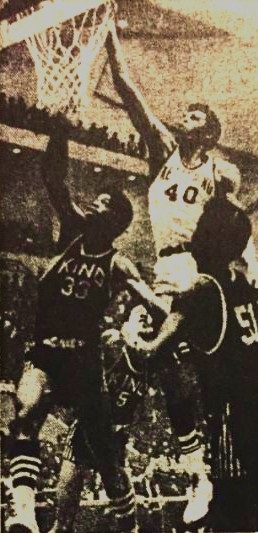 Fouls and turnovers nearly cost Ferndale its tournament life in its opener against Oak Park. With stars Tyrone Lewis and Billy Screws both in early foul trouble, the Eagles clung to a slim 35-33 lead with five minutes remaining, before escaping with a 45-39 win.
Fouls and turnovers nearly cost Ferndale its tournament life in its opener against Oak Park. With stars Tyrone Lewis and Billy Screws both in early foul trouble, the Eagles clung to a slim 35-33 lead with five minutes remaining, before escaping with a 45-39 win.
Kettering met Northeastern in a much-anticipated thriller in the District Final. Northeastern, with 15 of its 17 players now seniors, had advanced to the Class A Semifinals in March 1969. The teams had split their regular-season matchups in 1969-70. Boasting a distinct height advantage, Kettering had won by two points at Northeastern, 87-85, in mid-December with Hairston scoring 35 points, but the speedy Falcons, double-teaming Hairston, downed Kettering by eight points 86-78 at Kettering in a February rematch. Robinson scored 27 points and Mike Weaver, who later played at Michigan, notched 19 for Northeastern while Haywood tallied 27 for Kettering. Hairston was held to 14.
“We deserved to lose that game,” Kettering coach Walt Jenkins told the Free Press. “They got us to play their game instead of ours. I don’t think it will happen again ...”
Kettering blew a nine-point lead after one period but fought back to win 96-93 as Hairston scored 42 and pulled down 25 rebounds. Robinson finished with 41 points. “Northeastern’s hopes of upsetting Kettering were hampered when three players fouled out in the second half.”
Week 2
The Regional round brought much more excitement.
Ferndale escaped the Regional Semifinal “with a heart-pounding 66-64 victory” over Detroit Cooley. The Cardinals, 7-4 on the regular season, used their height advantage to create problems for Ferndale. Deadlocked at the end of both the first and second quarters, the Eagles led by 10 late in the fourth quarter before Cooley’s press interrupted things. Cooley cut the lead to two with nine seconds remaining before Ferndale was able to run out the clock. Lewis finished with 26 to lead the victors.
Ypsilanti fell on the same night, 76-70, to Detroit Catholic Central in overtime. Leading 67-64 with 16 seconds remaining, four points by DCC’s Frank Tanana Jr., including a layup with eight seconds left, knotted the score at 67-67 to force overtime. A pair of clutch field goals by Mark Barczuk in the extra frame ended Ypsilanti’s season. Tanana and Terry Frye both finished with 24 points on the night.
The Regional Final round tossed a few more favorites to the sidelines.
“Unrated and unsung … an also-ran in Public School League play, Will Robinson and his Pershing High Doughboys burst the Ferndale basketball bubble Saturday night” wrote Schram in the Free Press.
A crowd of 2,200 packed Southfield High’s gymnasium for Ferndale’s Regional Final game with Pershing.
The Eagles opened a quick 8-0 lead, and upped the lead to 10 points with three minutes to go in the first half before Pershing cut the margin to two, 41-39, at the break. By night’s end, 6-foot-4 sophomore Robert Hawkins had tallied 39 points, while 6-foot-8 junior Calvin Harper added 19 and 17 rebounds as Pershing scored a 90-88 upset.
In other Regional Final action, the Tractors of Dearborn Fordson, 17-3 on the year, held high-scoring George Gervin scoreless in the third quarter and to 17 points overall to upended Detroit Martin Luther King’s run, 64-62, while Ottawa Hills succumbed to Union. The Red Hawks had defeated the reigning champ twice during the regular season. Tradition-rich Benton Harbor upset Battle Creek Central, 88-85 in overtime.
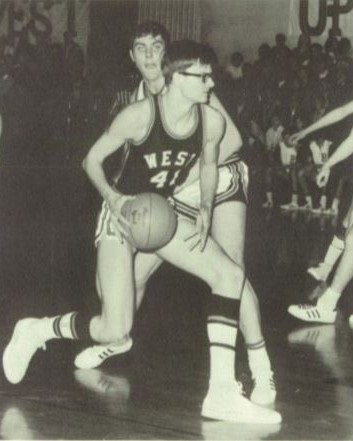 Also among the surprises, Flint Central, beaten by Pontiac Central by just 10 points early in the year, fell to unranked Midland 72-71 on a tip-in by Chemics senior guard John Reding with seven seconds remaining in their Regional Final. The teams had split a two-game series during the regular season.
Also among the surprises, Flint Central, beaten by Pontiac Central by just 10 points early in the year, fell to unranked Midland 72-71 on a tip-in by Chemics senior guard John Reding with seven seconds remaining in their Regional Final. The teams had split a two-game series during the regular season.
Pontiac Central trounced Birmingham Brother Rice, 60-39 in a game filled with offensive stalls by Rice.
Garden City West, led by 6-foot-7½ senior Rick Drewitz, were the tournament’s heart attack kids. Undefeated during the regular season, the Tigers finished at No. 6 according to the UPI poll, ninth in the Free Press, and 10th by AP. West had advanced to the MHSAA Regional Finals in 1969 when its line-up also included Rick’s older brother Duane, but, for whatever reason, the Tigers weren’t initially mentioned as a threat in 1970.
Following an easy 62-37 win over Livonia Franklin in their District opener, indeed it seemed that it was only a matter of time before West departed from the postseason.
Drewitz poured in an eye-popping 48 points in the team’s 71-67 victory over Livonia Bentley, but it had taken overtime and a last-second field goal in regulation to get there. Drewitz’s jumper off the free throw line at the buzzer had knotted the game, 64-64.
In the District Final, with Drewitz benched with fouls, junior Dennis Leszczynski drilled a field goal and a pair of free throws over the final 32 seconds to give West a 58-55 win over Livonia Stevenson.
Garden City had opened up a 40-30 third quarter lead over Ann Arbor Huron in its Regional opener when Drewitz was whistled for his fourth personal and headed for the bench. Huron quickly grabbed the lead, 44-43 before the big center returned in the final frame. Drewitz, who ended with 19 points, sank two key free throws with 90 seconds left, allowing the Tigers a 55-52 win over the River Rats, who finished the year at 10-10.
The Tigers slipped past Detroit Catholic Central 72-71 in the Regional Final – a foul-filled contest. Drewitz, who would play his college ball at Kentucky, was held to only five field goals, but nailed 20 of 25 free throws to lead all scorers with 30 points. Tanana, dealing with a bad ankle, limped through much of the match, and was held to 10 points. West sank 38 of 52 free throws on the night as officials called 55 infractions during the contest. A total of six players fouled out.
Quarterfinals
Upwards of 75,000 fans were expected to witness the four classes of MHSAA Quarterfinals hosted at 14 centers around the state. But without question, Crisler Arena was the place to be on that Wednesday night. The lone site with two Class A contests, Pershing would face Fordson in the 4:30 opener. The dream matchup between Pontiac Central and Detroit Kettering, and “the finest two big men to come out of the state in recent years,” juniors Russell and Hairston, was set for an 8 p.m. tipoff. Separate tickets were needed for each game, and the event had been sold out since the start of the month.
The matchup, won by Pontiac Central, 76-73, was everything it was expected to be. High drama came late in the third period when Russell, who finished with 32 points – 22 in the first half – twisted an ankle. But, as Jack Saylor told Free Press readers, “it was a pair of free throws by Jerry Ratliff with 42 seconds left that provided the Chiefs with their victory margin.”
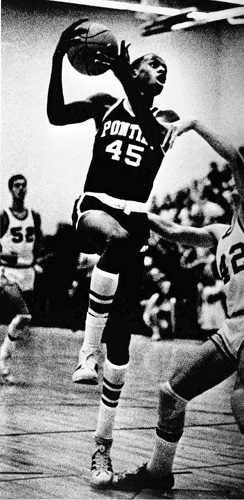 “After Ratliff’s foul shots had given Central a 74-70 lead, (Kettering’s) Floyd Haywood rammed in a rebound and completed a three-point play with a foul shot. Fifteen seconds remained, the Chiefs were out of time outs and Kettering (down by a point) was applying frantic pressure.”
“After Ratliff’s foul shots had given Central a 74-70 lead, (Kettering’s) Floyd Haywood rammed in a rebound and completed a three-point play with a foul shot. Fifteen seconds remained, the Chiefs were out of time outs and Kettering (down by a point) was applying frantic pressure.”
Kettering’s defeat was sealed when Pontiac guard Bill Glover, boxed in following the inbound pass, spotted Russell, who had returned to action with six minutes remaining, at the other end of the Crisler court. Glover’s intended pass was off the mark, instead falling “through the hoop, fully 85 feet away.”
“Until then, the game belonged to Russell, who had a clear margin over Lindsay Hairston in the battle of junior All-Staters.” Hairston led Kettering with 18 points, followed by Joe Johnson (who would play college ball at U-M) with 11. Ratliff added 18 for the Chiefs.
The game was the last for Kettering coach Jenkins, who had played football for Will Robinson at Miller and was now moving into administration as a high school principal.
Pershing’s starters went the distance, with four of the five scoring in double figures, ending Dearborn Fordson’s run, 73-61. Harper led Pershing with 24 points. Behind an outstanding all-around performance, Fordson’s Steve Burke, a 6-foot-3½ forward, topped all scorers with 26 points.
Garden City West easily turned back Benton Harbor in the Quarterfinals, 82-66. Drewitz grabbed 19 rebounds, scored 13 of 14 from the charity stripe and totaled 39 points on the night. “Benton Harbor’s fast break and full-court press troubled West most of the first half,” stated Curt Sylvester of the Free Press, “but strength on the boards and ability to get the ball in to Drewitz for his soft left-handed jumpers finally tipped the balance for Garden City.”
“(Drewitz is) everything they said he was,” Benton Harbor coach Ace Eisner told the Benton Harbor News-Palladium. “He rebounds well, he has a nice touch and he goes to the basket. Defensively, we just couldn’t stop him …”
A 15-foot bucket with 38 seconds remaining by John Reding followed by a Jeff Paulus free throw with seven ticks left on the clock gave Midland a 71-68 upset of Grand Rapids Union. Gerald Edwards finished with 21 points for Union, while Tom Pruss’ 19 points led the Chemics. It was a season to remember for Midland, as it nearly didn’t take place. According to John Kennett, a reserve on the Chemics team and later a part-time sportswriter for the Midland Daily News “ … residents of Midland had voted down a millage proposal earlier in the year. As a result, all extra-curricular activities were to be eliminated. Fortunately, a group of citizens and students banded together to raise enough funds to maintain the extra-curricular activities.”
‘The Last Extravaganza’
“They’re calling this State Tournament the last of the great extravaganzas,” wrote Free Press sports editor and columnist Joe Falls. “It’s the last time they’re having this two-day carnival in Jenison Fieldhouse. Next year they’re changing the format, and the site. … They’re spreading the tournament over four weeks instead of three and there is going to be no Friday-Saturday climax in East Lansing.
“Half of the fun is planning a big weekend in East Lansing. The mad scene here is something else. You can feel the swirl of excitement everywhere … in the hotel lobbies, the restaurants, the hamburg stands, the bars … as everyone is talking about these kids and the games they play …
“If anything, U-M’s, facility, the gleaming new Crisler Arena, is far superior to old Jenison Fieldhouse, where the fans sit on benches rather than in seats and the game is only a rumor in some corners of the end court sections.”
The Marathon
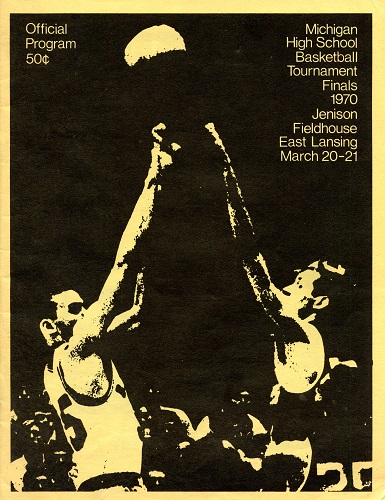 Three of the four Class A semifinalists making the trip to Jenison – Pershing, Midland and Garden City West – were unexpected guests.
Three of the four Class A semifinalists making the trip to Jenison – Pershing, Midland and Garden City West – were unexpected guests.
“Robinson’s Pershing team and its semifinal opponent, Midland, both qualify as ‘Cinderella’ teams,” wrote John Hill of the State Journal in his tourney preview. The Chemics had also been beaten four times during the regular season. “Midland is a smart, well-disciplined team that doesn’t commit many errors.”
Pershing’s success had been a surprise to everyone. The Doughboys had lost three seniors, including their best player, Paul Seals, to January mid-year graduation. According to Coach Robinson, the current squad was his second team – his bench. The coach recognized the skills of the 15-year-old sophomore, Hawkins: “He WILL be a good ballplayer … but he’s got a long way to go yet and he’s got a lot to learn.”
In Hill’s opinion, the Pontiac Central-Garden City West showdown – the last Semifinal game of the night at Jenison – might be the tournament’s premier contest. “Not only do both bring unblemished records to the game, but each has one of the state’s top players” in Russell and Drewitz.
As it turned out, Pershing completely dominated Midland in their contest as the Chemics were “outshot, outrebounded, and out defensed,” in their 82-71 loss. Only a strong finish saved them from a worse defeat. At game’s end, Pershing had launched 82 shots to Midland’s 68, hitting on 42.7 percent to the Chemics 39.7. The Doughboys ended with a 55-40 rebounding advantage. Hawkins scored 22 points in the opening half, and finished with 31. Harper fouled out, but added 24 points and a game-leading 17 rebounds before his departure.
Robinson, however, wasn’t pleased.
“I wasn’t particularly inspired by the performance,” he said. “Calvin fouled out stupidly. … We’ve worked too long and too hard to make so many silly mistakes. We can’t make those kinds of mistakes tomorrow.”
As predicted, the Central-West matchup was a classic.
“Pontiac Central may indeed be, as a growing number of the ‘experts’ think, the best prep overall basketball team to ply its trade in Michigan since the last of the great Benton Harbor clubs,” stated the State Journal about the Chiefs’ 84-79 victory over Garden City West. “Deadly though they may be, however, the undefeated Chiefs had all they could do Friday to withstand the largely single-handed upset bid of brilliant Garden City West pivotman Rick Drewitz.”
Russell “could do little to slow Drewitz,” who scored 42 points, a Class A Semifinal mark that would hold for 13 years. With multiple ties and lead changes throughout, Garden City trailed by one, 79-78, with 1:40 left to play. But Drewitz – who had scored 15 points in the fourth quarter – picked up his fifth personal with 1:12 remaining, and “Garden City’s hopes went to the bench with him.”
Russell ended with 31 points, but dominated the backboard with 25 rebounds. Many compared the contest to the Dave DeBusschere-Chet Walker, Detroit Austin-Benton Harbor championship game match-up from 1958, won by Austin, 71-68.
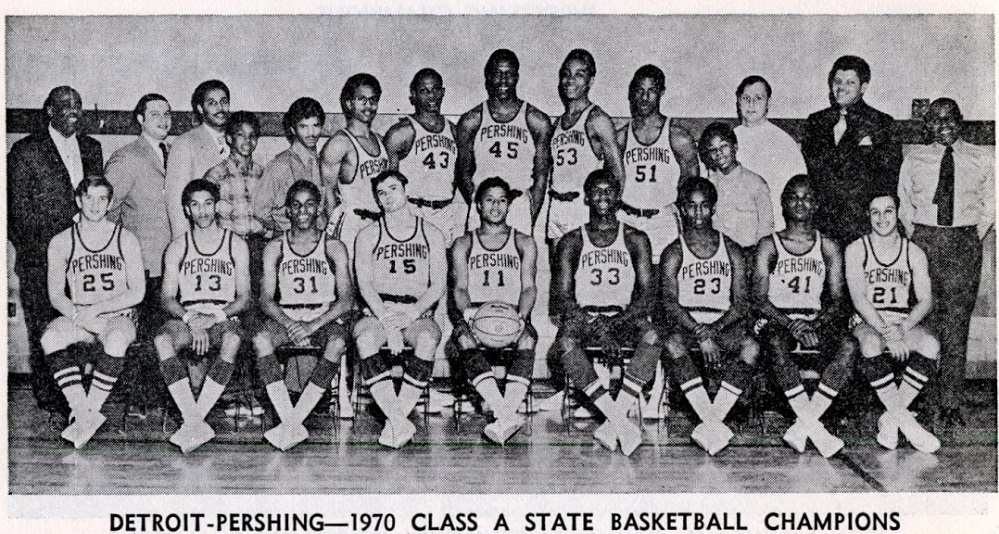 Coach Robinson and his team watched the battle, studying their opponent. The coach was impressed with Pontiac Central.
Coach Robinson and his team watched the battle, studying their opponent. The coach was impressed with Pontiac Central.
“They have more height than we do, more speed, more stamina, more poise and they’re an older team,” said Robinson. “But this is one I want.”
Circumstances made Pershing the sentimental favorite, but by all accounts, still the underdog entering the contest.
Storybook Ending
“Pershing High basketball squad staged one of the greatest upsets in Michigan high school tournament history here Saturday night before a steaming, screaming crowd of over 12,000 spectators in Jenison Field house,” exclaimed Schram in the Sunday paper.
“The Doughboys, loser of four games during the regular season, knocked off previously unbeaten Pontiac Central 86-81 in a real shocker.” The Swami, as he was nicknamed, had picked Pontiac to win.
“I know we’re the underdog. … I know few think we can win it,” Robinson had told 500 coaches at the annual banquet of the Michigan High School Coaches Association a couple of hours before tip. “But I’ve got a feeling.” Robinson was in attendance as he was being inducted into the coaches association Hall of Fame.
With the win, Pershing’s team had delivered a beautifully wrapped going away present to the coach.
“In the early going … it looked like the Chiefs would run away with it,” continued Schram. “Pontiac pounded to a 10-4 lead and Robinson called a hasty time out. Robinson sent … Harper to the low post crowding the basket and Harper started a fantastic series of easy layups, turn-around jumpers and tip-ins.” He finished with 24 points.
“Tiny (5-foot-6) but very aggressive guard Phil Paige … got them out front to stay by sparking a 23 point second period with 13 points,” noted the State Journal. The Doughboys’ captain, Paige would finish with 19 on the night.
“Late in the second period, Harper and Darrel Jeter started hitting the boards and Pershing continued to click on its shots,” continued the Free Press. “The Doughboys worked out a six-point lead, 39-33, at halftime.
“The Doughboys maintained the six-point margin in the third quarter, 64-58,” added the Detroit News. “Four times in the final quarter, however, Pontiac slashed Pershing’s lead to two points – at 70-68, 72-70, 74-72 and 76-74. With 2:23 left, Hawkins sank two free throws and … Jeter tipped in a field goal to give Pershing an insurmountable lead … 80-74.”
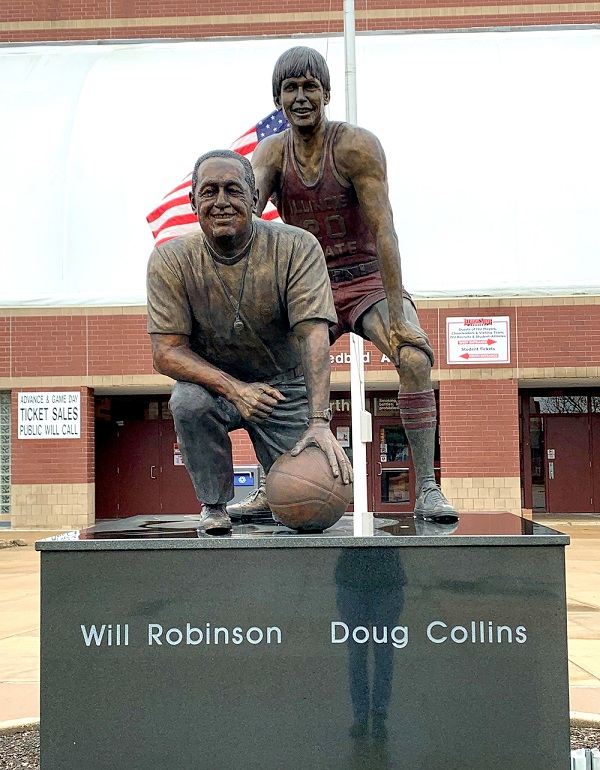 A pair of free throws by Paige and two additional baskets by Hawkins capped the upset.
A pair of free throws by Paige and two additional baskets by Hawkins capped the upset.
At the final horn, fans mobbed the team. According to Schram, the celebration “rivaled the famed Lansing Sexton – Hamtramck classic of a decade (previous) when the winning shot dropped in overtime after the buzzer.”
Following the game, Robinson, now ready to start recruiting for the future, pitched Russell for his services:
“You’re going to come down to Illinois and play for me, aren’t you? You’ll be All-American and we’ll win the NCAA.”
Illinois bound
The team chose to celebrate the title at a Big Boy restaurant. Then Robinson departed for Normal, Ill., appearing before the local Jaycees that Monday night.
“I’m glad the opportunity came along,” Robinson said before his departure. “I just wish it had come along in Michigan. I never was offered a college job here.”
Robinson had bid for several college coaching positions in the past, only to be turned down.
“I love this country. I wouldn’t want to live anywhere else in the world, I’m just sorry it has a blind spot.”
 Ron Pesch has taken an active role in researching the history of MHSAA events since 1985 and began writing for MHSAA Finals programs in 1986, adding additional features and "flashbacks" in 1992. He inherited the title of MHSAA historian from the late Dick Kishpaugh following the 1993-94 school year, and resides in Muskegon. Contact him at [email protected] with ideas for historical articles.
Ron Pesch has taken an active role in researching the history of MHSAA events since 1985 and began writing for MHSAA Finals programs in 1986, adding additional features and "flashbacks" in 1992. He inherited the title of MHSAA historian from the late Dick Kishpaugh following the 1993-94 school year, and resides in Muskegon. Contact him at [email protected] with ideas for historical articles.
PHOTOS: (Top) Detroit Pershing players and coach Will Robinson celebrate their 1970 Class A championship win. (2) Coach Will Robinson, in 1958 while at Detroit Cass Tech. (3) Detroit King’s George Gervin, who would go on to star in the NBA. (4) Kettering’s Lindsay Hairston, who along with Campy Russell, was among the most sought-after players in the state; he would ultimately take his game to Michigan State. (5) Rick Drewitz of Garden City. The son of a junior high principal, Drewitz chose to play college ball at the University of Kentucky choosing that program over Michigan, Wisconsin, Louisville and Toledo. (6) Considered the top prospect in the nation, Campy Russell received offers from at least 100 schools before selecting University of Michigan. He had narrowed his list to Michigan, Michigan State, Minnesota and Long Beach State. (7) The game program for the final rounds of the 1970 MHSAA Boys Basketball Tournament. (8) The 1970 Detroit Pershing team photo. (9) The Will Robinson-Doug Collins statue outside the north entrance of Illinois State University’s Redbird Arena, unveiled in September 2009. Calvin Harper, Phil Paige, Robert ‘Bubbles’ Hawkins, and Darrel Jeter from Pershing would all follow Robinson to ISU. (Photos collected by Ron Pesch; statue photo by Allison Antink Meyer.)
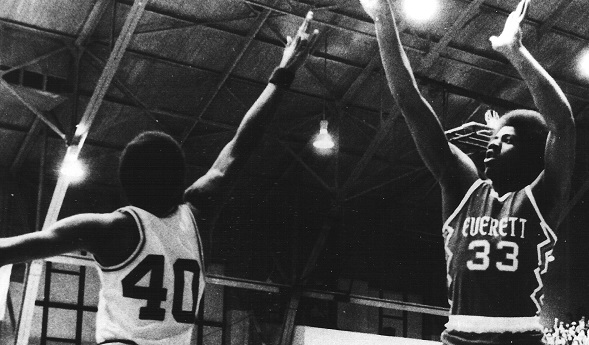
BCAM Names '7s' Retro Mr Basketball Winners
May 1, 2017
Basketball Coaches Association of Michigan
Forty years after scoring his last basket at the high school level, Earvin “Magic” Johnson is finally a BCAM Mr. Basketball.
“When we began talking about this award, we thought of all the great players who never had the opportunity to win it,” said Al Schaffer, chairman of the Association’s Mr. Basketball committee at the announcement of the Michigan’s Mr. Basketball award back in 1981. “Players like Earvin Johnson, Dave DeBusschere, Chet Walker, Frank Tanana, Sr.; Mel Peterson, Richie Jordan, Campy Russell and many, many others.”
In 2010, the Basketball Coaches Association of Michigan launched a decade-long program meant to honor those very athletes. The Retro Mr. Basketball award looks back at the state’s top senior prep basketball players for the years 1920 through 1980. This year marks the eighth year of the project, and places the spotlight on the senior athletes for the years that end in seven – 1927, 1937, 1947, 1957, 1967 and 1977.
“Those six school years include some of the state’s greatest names,” said BCAM president Tom Hursey. “BCAM was incorporated in the summer of 1976, and first presented the ‘Mr. Basketball’ award in 1981 to Lansing Eastern’s Sam Vincent. Earvin ‘Magic’ Johnson was one of the inspirations for the award. It’s nice to see him honored after all these years.”
Members of the Association’s Retro Mr. Basketball committee assembled between sessions of the MHSAA Boys Basketball championships in March to identify, then select the latest group of honorees.
“With their selections, a total of 49 seniors from the Retro years have now been named,” said Ron Pesch, historian for the Michigan High School Athletic Association and the individual tasked with identifying candidates for the award. “When combined with the 37 winners of the modern Mr. Basketball award, Michigan now has 86 individuals we call “Mr. Basketball.”
The names of this year’s selections will be added to plaques that surround the base of the original Mr. Basketball trophy created by BCAM in 1981.
PAST WINNERS OF BCAM’S RETRO MR. BASKETBALL AWARD
(College Attended Shown In Parenthesis)
1980 Tim McCormick, Clarkston (Michigan)
1976 Stuart House, Detroit Denby (Washington State)
1975 Bruce Flowers, Berkley (Notre Dame)
1974 Tony Smith, Saginaw (Nevada-Las Vegas)
1973 Tom LaGarde, Detroit Catholic Central (North Carolina)
1972 Larry Fogle, Detroit Cooley (Canisius)
1971 Michael "Campy" Russell, Pontiac Central (Michigan)
1970 Rick Drewitz, Garden City West (Kentucky)
1966 Rudy Tomjanovich, Hamtramck (Michigan)
1965 L.C. Bowen, Benton Harbor (Bradley)
1964 Willie Betts, River Rouge (Bradley)
1963 Craig Dill, Saginaw Arthur Hill (Michigan)
1962 Ernie Thompson, Saginaw (Bradley)
1961 Reggie Harding, Detroit Eastern
1960 Peter Gent, Bangor (Michigan State)
1956 Mel Peterson, Stephenson (Wheaton)
1955 M.C. Burton, Jr., Muskegon Heights (Michigan)
1954 Pete Tillotson, Ludington (Michigan)
1953 Ron Kramer, East Detroit (Michigan)
1952 Frank Tanana, Sr., Detroit St. Andrew
1951 Webster Kirksey, Saginaw (Eastern Michigan)
1950 Charlie Primas, Detroit Miller (Wayne State)
1946 Jack Forestieri, Benton Harbor (Norte Dame)
1945 Bob Swanson, Lansing Sexton (Michigan)
1944 Dick Rifenburg, Saginaw Arthur Hill (Michigan)
1943 Don Boven, Kalamazoo Central (Western Michigan)
1942 Larry Savage, Saginaw (Northwestern)
1941 Don Osterman, Detroit St. Theresa (Villanova)
1940 Ralph Gibert, Flint Northern (Michigan)
1936 Charles Pink, Detroit Northwestern (Michigan)
1935 John Zwier, Holland Christian
1934 Earl Brown, Jr., Benton Harbor (Notre Dame)
1933 Lincoln Dodson Truss, Flint Northern
1932 Lowell Matteson, Portage
1931 Edward Huttenga, Grand Haven (Western Michigan)
1930 John Tooker, Kalamazoo St. Augustine (Michigan)
1926 Roger Grove, Sturgis (Michigan State)
1925 Joe Truskowski, Detroit Northeastern (Michigan)
1924 Bennie Oosterbaan, Muskegon (Michigan)
1923 Henry Schrumpf, Niles (Western Michigan)
1922 Royal Cherry, Grand Rapids Union (Michigan)
1921 George Haggarty, Ypsilanti (Michigan)
1920 Harry Kipke, Lansing Central (Michigan)
2017 SELECTIONS FOR BCAM’S RETRO MR. BASKETBALL AWARD
(The winner of the award is listed below at the top of the page in ALL CAPS, while finalists for the award follow and are listed alphabetically.)
1977 RETRO MR. BASKETBALL
EARVIN ‘MAGIC’ JOHNSON, LANSING EVERETT – “May be the best prep player ever in Michigan” stated United Press International at the conclusion of his prep career, and today, few would debate that assessment. Johnson totaled 2,012 points in his high school career, including an average of 28.8 points per game as a senior. Dominant across all aspects of the game, opposing coaches praised his ability to control a contest. The sophomore fouled out in his varsity debut, missing about a third of the game, but still grabbed 16 rebounds and scored 12 points against Holt in early December 1974. By February of 1975, Lansing sportswriters called him “Magic.” A first-team Parade All-American as a 6-foot-8½, 198 pound senior, Johnson was named a first-team all-stater by The Associated Press in all three years of varsity play. In 1977, Johnson led Everett to a 62-56 overtime victory over Birmingham Brother Rice in one of the all-time classic Class A title games.
1977 FINALISTS
Rick Baillergeon, Maple City Glen Lake, 6-2 – Scored 16 points as Glen Lake downed Detroit East Catholic 70-68 for Class D championship. The points brought Baillergeon’s four-year career total to 2,144 – second most in the state at the time behind Richie Jordan, who tallied 2,210 points for Fennville between 1962 and 1965, and four more than Dom Jacobetti’s total of 2,140 points, scored over four seasons at Negaunee St. Paul. A 60-percent field goal shooter, Baillergeon continued his playing days at Ferris State.
Tim Bracey, Grand Rapids Creston, 6-2, 170 – Excellent at both ends of the court, Bracey was a two-time scoring champion in the City League and averaged 24.3 points, 13 rebounds, and six assists per game as a senior.
Kevin Smith, Birmingham Brother Rice, 6-1½, 165 – Called “the finest guard to ever play basketball in the Catholic League” by Mick McCabe of the Detroit Free Press, Smith was accurate on 81 percent of his free throws while averaging 29 points, seven assists, five steals and six rebounds per contest as a senior. His 47-foot shot at the end of regulation of the 1977 Class A championship against Lansing Everett sent the contest to overtime.
Jay Vincent, Lansing Eastern, 6-7, 230 – Vincent was a starter beginning his sophomore year but played largely in the shadow of Earvin Johnson. Still, he was the second-leading vote getter on the UPI all-state team. Vincent totaled 1,512 points over his prep career, a number that would have been higher had Eastern been able to get past Johnson and Everett in the District round of the annual MHSAA tournament during those three seasons.
1967 RETRO MR. BASKETBALL
SPENCER HAYWOOD, DETROIT PERSHING – “He just might be the finest 16-year-old player in the United States,” said his coach Will Robinson about the transfer from Mississippi who arrived at Pershing in the fall of the 1965-66 school year. Only the Detroit Free Press named the 6-foot-7 junior to its all-state team that winter, but one year later, the Detroit News, Free Press, Associated Press and United Press International had all discovered Haywood, and named him to their respective top all-state squads. Haywood demanded respect around the boards, grabbing 544 rebounds – 169 on offense and 375 on defense – while blocking 160 shots. A Parade magazine third-team All-American, he averaged 29.1 points per game as a junior and 25.6 over his prep career, hitting on 74 percent of his free throws while dishing out 120 assists. Helped lead the Doughboys to the 1967 Class A championship, the first for Robinson.
1967 FINALISTS
Tim Bograkos, Flint Central, 6-1, 175 – The second player in Flint history to score more than 600 points in his career, Bograkos totaled 726 points over two seasons of varsity play. Honor student and team captain of the football, basketball and baseball teams, as a senior he averaged 17 points per game, leading the Indians to the Class A Final, a 90-66 loss to Detroit Pershing.
Dan Fife, Clarkston, 6-3½, 185 – Averaged 12 rebounds and better than 32 points per contest as a senior. Scored 52 points in a game and totaled 1,589 points over his three years of varsity play at Clarkston. Fife played college ball at Michigan, then returned to Clarkston where he has served as varsity basketball coach for 35 years. In March 2017, the Wolves topped Grand Rapids Christian for the Class A championship – a first for Coach Fife.
Ralph Houston, Muskegon Heights, 6-4½, 178 – Possessing excellent size and speed, Houston averaged just shy of 20 points per game for the Tigers, scoring 381 points total while corralling 208 rebounds as a senior.
Kennedy McIntosh, South Haven, 6-6½, 220 – A Class B all-state selection as a junior, McIntosh earned Dream Team recognition from the Detroit News as a senior, averaging 18 rebounds and more than 25 points per game during his graduation year. Attended Eastern Michigan following high school before advancing to the NBA.
1957 RETRO MR. BASKETBALL
ED BURTON, MUSKEGON HEIGHTS – A rugged rebounder who carried a 20-point-plus scoring average as both a forward and center, the 6-foot-6, 201-pound Burton was the top vote getter in the Detroit Free Press coaches all-state poll. Scored 1,143 points to break the Heights’ career scoring mark set by his brother, M.C. Burton, by two points. As a senior, “Big Ed” hit 20 field goals and tallied 44 points versus Traverse City in tournament Quarterfinal play, and 17 points versus Benton Harbor and star junior Chet Walker in the Semifinals. In the 1957 Class A title contest, Burton scored 25 points, including 13 of 15 shooting from the foul line, against Detroit Austin Catholic and its top ballplayer, junior Dave DeBusschere. Burton’s 31 rebounds against Traverse City in Quarterfinal action still stands as an MHSAA final round record.
1957 FINALISTS
Charles North – Detroit Northwestern, 6-3½, 185 – Led Northwestern to the City Championship, and was the team’s top rebounder and clutch scorer. Later played for the University of Detroit.
Dave Southwell – Parma Western – 6-4, 205 – A repeat first-team all-state selection by the Free Press, Southwell was amazingly agile, and turned in his best games against Parma’s toughest opponents. “Would rather set up his teammates than to score himself,” wrote the Michigan Center coach at the time of balloting for the 1957 all-state team. “He took eight shots against us and hit on five.” High praise considering Southwell put up 47 against Michigan Center as a junior.
Tom Villemure, Newberry, 5-10, 180 – Averaged 33.3 ppg as a guard at Newberry, and was the state’s leading scorer in 1957. Later a two-time MVP at Sault Tech (now Lake Superior State) then continued his playing career at University of Detroit. Served as head coach at Grand Valley State for 24 years.
Tom Wilson, Lapeer, 6-1, 178 – The top name in Class B basketball in 1957. Scored over 1,300 points in his career at Lapeer and 36 points or more in six straight games. Tom was the third of the Wilsons to play football at Michigan State behind oldest brother John, a defensive back at MSU, and Pat, a quarterback and basketball player for the Spartans. Tom would also play both sports at Michigan State.
1947 RETRO MR. BASKETBALL
SAMMY GEE, DETROIT MILLER – A 5-foot-8, 150-pound set-up artist, Gee was a quick thinking floor general and one of the city’s top scorers for coach Will Robinson’s Trojans. Well known across the state despite the fact Detroit Public School League teams did not compete in the MHSAA-sponsored tournament, Gee scored 15 points to lead all scorers as Miller won its first-ever PSL championship before 8,000 fans at the State Fairground Coliseum in Detroit. Miller then downed Detroit St. Joseph in Detroit’s first postseason championship between the PSL and the city’s parochial champion. The game was played in front of 16,041 spectators at Olympia Stadium, at the time the largest crowd ever to see a basketball game in Michigan. As a testament to his skills, Gee was signed by the Harlem Globetrotters out of high school. An outstanding baseball player as well, he was inked by the Brooklyn Dodgers and played minor league ball for the organization for parts of two seasons.
1947 FINALISTS
Bill Agre, Saginaw Arthur Hill, 6-0, 150 – Only Saginaw Valley member to score a spot on the Detroit Free Press all-state first team. An aggressive, hard driving guard, Agre was the Valley’s top defensive player and received the most votes when named to the league’s all-conference team.
Chuck Murray, Birmingham, 5-11 – Another first-team selection by the Times, Murray also was named to the second team by the Free Press. Considered one of the state’s most versatile athletes, competing in football, baseball and track, but basketball was considered his best sport. Held Birmingham’s single-season scoring mark with 210 points in 15 games.
Bob Nagel, Lansing Eastern, 6-2, 185 – A unanimous all-5A Conference first-team selection, Nagel was a first-team selection in the Free Press. An outstanding all-around athlete, he was Class A pole vault champion in the spring of 1947.
Bob VanDyke, Holland – 6-5, 200 – Scored 296 points in 17 games to set a new scoring record at Holland, with six games of 20 points or more.
1937 RETRO MR. BASKETBALL
BOB OSTERMAN, DETROIT ST. THERESA – A 6-foot-4 center, Osterman led Detroit St. Theresa to Class B titles in 1936 and 1937. Only first team repeater on the Detroit Free Press all-state squad, he was named to the paper’s second team in 1935 as a sophomore. Scored 793 points over four years at St. Theresa – better than 11 points per game. Tallied 16 points in a little more than three quarters of play, as St. Theresa downed Marshall in the Class B Final in 1937. Later played football at Notre Dame. Brother of Don, who was named Retro Mr. Basketball for the 1940-41 season.
1937 FINALISTS
Gene Brogan – Lansing St. Mary – A clever dribbler and top-notch playmaker, Brogan was the main cog in St. Mary’s drive to back-to-back Class C championships. Helped the “Big Blue” piece together a 27-game win streak spanning the 1936 and 1937 seasons. The loss, to eventual 1937 Class B champion Detroit St. Theresa, was St. Mary’s lone defeat in 25 matchups in ’37 and one of four over the two-year span.
Jack Newman, Grand Rapids Union – “A fine passer,” Newman was the “leading scorer in the Grand Rapids City League for two seasons.”
Melvin Peterson, Muskegon – Captain and top marksman for the Big Reds, Peterson helped guide Muskegon to a flawless 18-0 mark and the Class A championship. A guard praised for his playmaking ability, he finished third in scoring in the Southwestern Conference with 64 points over 10 games. Later played basketball at Michigan State.
Grady Truss, Flint Northern – The first African-American player to captain Northern’s basketball team, the 6-foot-4 Truss played center and finished his senior year as the second-leading scorer in the Saginaw Valley league with 108 points. A first team all-state selection by the Free Press, Truss earned second team all-state honors as a junior, and was a third team pick as a sophomore. Northern finished as runner-up to the state title in 1935, won the Class A title in 1936, and advanced to the Quarterfinals, losing to cross-town rival Flint Central, in 1937. Grady was the younger brother of Lincoln Dodson Truss, who was named Retro Mr. Basketball for the 1932-33 season.
1927 RETRO MR. BASKETBALL
BILL MCCALL, MUSKEGON – Led the basketball team to a 20-1 record and a Class A championship in the winter of 1927. Named to the All-Tournament team, McCall was also a two-time all-state selection in football, where he helped guide Muskegon to mythical championships in the falls of both 1926 and 1927, the first titles under the leadership of head coach C. Leo Redmond. Later starred at Dartmouth University in both sports.
1927 FINALISTS
Harold Green, Detroit Northern – Named captain of the Detroit Free Press mythical All-City team, Green was “a small thin chap,” who played “like a flash of lightning.” Finished second in scoring in Detroit as a senior, he was considered one of the few players who could do all things well.
George Markley, Pontiac – In his first year on varsity, Markley developed into a brilliant player. His specialty was tapping the ball in from under the basket and his work in the MHSAA tournament, played at Detroit Central, earned him the position of All-Tournament forward.
Al Milanski, Detroit Northeastern – Twice named to the first-team All-City squad by the Detroit Free Press. Top scorer in the city, Milanski averaged better than 10 points per game as a senior. “Fast man down the floor, especially adept at receiving passes and one of the surest shots in the city within a reasonable distance of the basket.”
Ray Priest, Battle Creek Central – Outstanding forward of the state tournament, according to the Battle Creek Enquirer. Played a beautiful floor game, offensively and defensively. First player in Battle Creek history to earn all-state in both football and basketball. Mid-year grad. Played football at the University of Michigan following high school.
PHOTO: Lansing Everett's Earvin Johnson (right) puts up a shot over Lansing Eastern's Jay Vincent during their high school careers.

